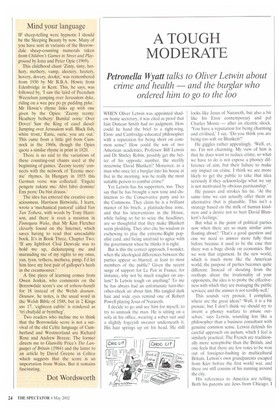Mind your language
IF sheep-telling were hypnotic I should be the Sleeping Beauty by now. Many of you have sent in variants of the Borrowdale sheep-counting numerals taken from Children's Games in Street and Playground by Iona and Peter Opie (1969).
This childhood chant `Zinty, tinty, hethery, methery, vamp, aleetery, heetery, hovery, dovery, dookit,' was remembered from 1930 by Mr R.B.A. Howie from Edenbridge in Kent. This, he says, was followed by, 'I saw the laird of Peezelum Weezelum jumping over Jerusalem dyke, riding on a wee pee po py pudding pyke.' Mr Howie's rhyme links up with one given by the Opies: "Zeenty teenty/ Heathery bethery/ Bumful oorie/ Over Dover/ Saw the King of easel diesel/ Jumping over Jerusalem wall. Black fish, white trout,/ Earle, oarie, you are out.' This came from a little girl from Cumflock in the 1960s, though the Opies quote a similar rhyme in print in 1820.
There is no end to the variations of these counting-out chants used at the beginning of games. `Zeenty teenty' connects with the network of Teenie meenie' rhymes. In Hungary in 1855 this German verse was collected: 'Engete pengete zukate me/ Abri fabri domine/ Enx penx/ Du bist draussf The idea has entered the creative consciousness. Harrison Birtwistle, I learn, wrote a 'mechanical pastoral' called Yan Tan Tethera, with words by Tony Harrison, and there is even a mention in Finnegans Wake, that Mr Kim Fletcher cleverly found on the Internet, which saves having to read that unreadable book. It's in Book Three, Chapter Two: 'If any lightfoot Clod Dewvale was to hold me up, dicksturping me and marauding me of my rights to my onus, yan, tyan, tethera, methera, pimp, I'd let him have my best pair of galloper's heels in the creamsourer.'
A fine piece of learning comes from Owen Jenkin, who comments on the Borrowdale score's use of tethera-bumfit for 18 instead of the Welsh deunaw. Deunaw, he notes, is the usual word in the Welsh Bible of 1588, but in 2 Kings xxv 17, 'eighteen cubits' is rendered as `tri chufydd ar bymtheg'.
Two readers who incline me to think that the Borrowdale score is not a survival of the old Celtic language of Cumberland and Westmorland are Richard Rose and Andrew Breeze. The former directs me to Glanville Price's The Languages of Britain (1984) and the latter to an article by David Greene in Celtica which suggests that the score is an importation from Wales. But it remains fascinating.
Dot Wordsworth






































































 Previous page
Previous page